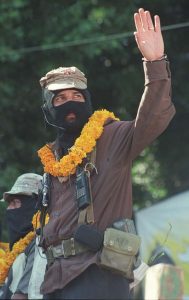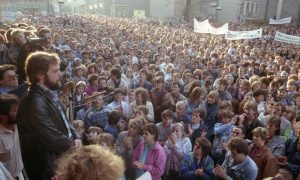The movement called Zapatismo has a loaded symbolic significance in the context of global social movements. Somehow, this (largely unsuccessful) movement of indigenous people and failed Marxist revolutionaries in Mexico has inspired many an activist around the world (Khasnabish 2010). This is not, because the movement was so awfully effective or because their goals were so absolutely universal. I believe the reason is, that they captured what many felt needed to be done – to fight inequality and injustice through collective practices of the self. Some argue, that in their approach new political spaces emerge and a new political culture is practiced (Dellacioppa 2009).
The example is worth considering because it gives some indication of the complexities that lie in resisting. In way, the Zapatista movement playfully enacts, what postmodern theory so elegantly disguises in bloomy language. In the Zapatista movement we see what it means to use techniques of the body in order to induce change. We learn how appropriation is at once a struggle and transformative for both sides. And we may learn about the limits of the strategies.
Let’s consider techniques of the body. The Zapatistas have been called a leaderless movement – but nor for lack of leadership. In fact, a person called “Subcommandante Marcos”, is widely considered to be a significant face of the movement. But it is a face behind a mask and his (her?) real identity was long unknown. Subcommandante Marcos is the symbolic representation of leadership, of the voice of the Zaptistas and it has long since become irrelevant to find out more about the person. Marcos is a constructed person with features – such as the mask – that make sure he (she?) could be anyone. Indeed, this is a reflection of a central idea of the movement – that all struggles for justice are related and that the individuals behind them are merely the diverse representations of these struggles. In hiding the face and creating anonymity, the road to identification for many different actors is opened.
Let’s consider appropriation. The Zaptista movement of the 199oies emerged out of an encounter between indigenous people and (failed) Marxist revolutionaries. Two worlds of ideas came together and merged in an unexpected way to form not so much an ideology as more an ongoing process of re-appropriation. Furthermore, new issues were taken up and appropriated in the process, which were dominant in neither indigenous societies nor capitalism and its Marxist critique. Khasnabish shows this in relation to the participation of women (p. 74 ff.). The process of reappropriation did not just allow dominant ideas to mingle, it made room for new ideas.
Most striking to me is the how this came about. It begins with a simple (?) redefinition of the self:
“It fell to the lowest citizens of this country to raise their heads, with dignity. […] We cannot let ourselves be treated that way, and we have to try and construct a better world […] This is what we want. […] We have dignity, patriotism and we are demonstrating it.” (Subcommandante Marcos 2002 “Testimonies of the First Day”)
The Zapatistas decided to have dignity at the beginning of the struggle, they redefined themselves as acting subjects. They gained dignity by claiming it. It reminds me of a discussion on the 1989 revolution in East Germany a couple of years ago.
A participant asked one of the then-activists why they had suddenly begun to demonstrate, what had changed? And the activist said, that nothing had really changed, they had simply not been afraid anymore. She didn’t really know why the fear was gone, but it was and that changed everything. Should it be that easy? Maybe not. But it is worth debating, in how far the understanding of the self impacts the ability to act and if we cannot find ways in which this has had real life consequences.
Finally, the limits. Clearly, neither have the Zapatistas destroyed global capitalism nor has the East German revolution quite lead to the world people imagined. Should movements (and reconstructed selfs) be judged by how far they got? Or is it all about process? If so, how? Or can, maybe, resistance of this kind not ‘succeed’ in any obvious sense of the word? And what does that mean for resistance? A lot to do…..
Tags: globalization, imagination, performance, Storytelling, Zapatistas




 Die
Die
Am 8. June 2016 um 16:53 Uhr
There is a nice coincidence: Today (Wednesday, 7th June) at 6 pm the “Rotes Café” (at the Otto Suhr Institute, Harnackstr. 1a) shows the documentary “Zapatistas, Chronik einer Rebellion”.
Here is the event description (in German):
An Neujahr 1994 erhoben sich die Zapatistas (Indigenas aus dem südostmexikanischen Bundesstaat Chiapas) mit einem „Ya Basta!“ („Es
reicht!“) gegen Regierung, neoliberalen Kapitalismus, Rassismus,
Patriarchat und Ausbeutung. Seitdem leben sie in ihren über 1000
Gemeinden eine auf Gleichberechtigung, Basisdemokratie und Solidarität
basierende Alternative. Ihre anhaltende und gelebte Revolution hat viele
Menschen weltweit inspiriert. Die Zapatistas sehen ihren Aufstand als
Teil eines weltweiten Widerstandsnetzwerkes.
Nach dem Film wird es Zeit geben, den Film sacken zu lassen, Fragen zu
stellen oder zu diskutieren.
Der Eintritt ist frei, Spenden oder mitgebrachte Knabbereien oder andere
schöne Dinge sind erwünscht.
Am 10. June 2016 um 07:11 Uhr
Amazing case. Spent all night on Zapatistas.
Am 8. October 2023 um 01:44 Uhr
To construct a better world, we must first understand our shared humanity, where am i,and also work together from different location worldwide
Am 8. October 2023 um 01:46 Uhr
The world gets better with us, for my location and for everybody despite differences